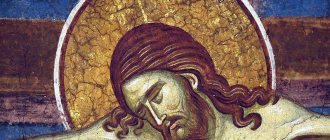One of the most serious problems in the spiritual life of a believer is the problem of faith. Most people, considering themselves believers, have absolutely no faith. What motivates them in their spiritual life? Do they know about this?
Sometimes we don’t even suspect how much power superstition has over a person in his sinful state. Many, and even, oddly enough, Christians who have been attending church for more than one year, do not realize that in their spiritual life they are not guided by faith at all, but by pure superstition.
What is superstition and why modern people believe in them - about this in a conversation with the rector of the temple in honor of the icon of the Mother of God “Assuage my sorrows” in the city of Saratov, abbot Nektariy (Morozov).
True faith allows a person, still here on earth, in time, to be involved in eternal life
– Father Nektary, what is the difference between faith and superstition?
– I would answer with a counter question: what, strictly speaking, do both have in common? Almost nothing. After all, faith - even if we are talking about a completely earthly faith devoid of a religious dimension - in ideals, in principles, in a person, finally, this is what elevates a person, makes him better, fills his life with the necessary content. Faith in God, true faith, not only elevates, but allows a person, still here on earth, in time, to become involved in eternal life, to actually enter into it. This faith is the guarantee of salvation, unity with God, and achievement of the Kingdom of Heaven.
And superstition... this is perhaps also faith... But in what and what kind? In some signs, signs. This faith is vain, that is, unfounded, empty, sometimes funny and absurd, sometimes terrible. And if true faith is the connection between man and his Creator, then vain faith is the barrier separating him from Him.
– How do superstitions appear, and why do we believe in them?
– The reason for the emergence of superstitions is the impoverishment of true faith. A person forgets about God or outright rejects Him, but it turns out that he cannot live without faith at all - this is how the feeling of his own weakness, limitation, and, in fact, creatureliness manifests itself. And the one who declared his independence from a loving, merciful, but also omnipotent God falls into some kind of humiliating dependence on meaningless things. He changes the road if a black cat runs across it, crosses himself when he sees a priest - that’s also a bad omen, he’s ready to kill a woman with empty buckets, he spits over his left shoulder, he knocks on the table so as not to jinx him... How many other stupid things like this have been invented? Who invented it? I think those who hate people the most and would be happy to destroy everyone and everyone, but acquire power only over those who voluntarily turn away from the truth.
What are signs?
Photo: Pixabay.com
The term “sign” is derived from the verb to note. Since ancient times, people have noticed a certain pattern in a number of events. So when one phenomenon occurred, another followed, which made it possible to draw a conclusion about the relationship. If the incident was repeated and led to the same consequences, a unique forecast for the future emerged, which was firmly fixed in the memory of entire generations.
At the same time, the signs concerned not only everyday accidents, but also weather conditions, family well-being, health and other aspects of simple life. So, for example, it was believed that abundant snow cover in winter leads to a rich harvest in summer, as do spring thunderstorms, and a boy’s good appetite leads to increased performance in adulthood.
A modern person can easily explain the relationship between snow cover and high spring crop yields, or the full development of a child with a balanced diet. But our ancestors did not have a basic education, so they used only natural observation and logical thinking.
Thoughts "by surprise"
-Where did prejudice come from? And why are they so tenacious among the people?
– What is the mechanism for spreading rumors? Do you know the famous expression “one grandma said”? It’s the same here: one grandmother said one thing, another authoritative grandfather said something else... And it began to be passed on from mouth to mouth, gradually turning into a whole unwritten set of legends of elders and elders. But there is a well-known spiritual law: “what the wicked fears” will befall him. It happened to someone, then someone else - and now the “sign” is ready.
“It’s quite strange to watch a mature person believe in ridiculous things.” Spilled salt and broken mirrors plague the lives of many people. And both old women and completely modern people are afraid to pass it across the threshold. How to deal with this?
– I think fighting superstitions as such is not the most promising activity. We must fight the unbelief that gives rise to them. Faith will take its place, and superstitions themselves will disappear. Although in each individual case it is necessary to explain, with patience and love, that a person’s life and the person himself do not depend on some formal and extremely frivolous external signs and will accept that we are all in the hands of God, and not even a hair from a person’s head will fall to the ground without the will of the Lord.
– Many prejudices are associated with the magic of numbers: days, numbers and months. There are people who get upset to tears if they come across the 13th place, and if the 13th coincides with Friday, you can generally expect catastrophic things...
– And yet wars do not begin according to schedule, not on Fridays without fail, not on the 13th and not at 13 o’clock... And crimes are committed on any day of the week and at any time of the day. And people die not according to the “schedule”. What can I say - if a person does not have the fear of God, then he will be afraid of everything - every number, and every “threatening” set of circumstances, and every rustle, and every shadow...
Believing in prejudice means being in confrontation with the Church
There are many other signs and superstitions associated with death and burial. Every settlement has its own unique burial traditions, passed on from generation to generation. Mostly, older women consider themselves knowledgeable and enlightened in these They do not understand at all, and sometimes, on the contrary, they deliberately put themselves in confrontation with the teaching of the Church and the Holy Fathers.
All witchcraft and witchcraft are unacceptable in Orthodox traditions, including burial traditions. Any such information should be approached with great caution, remembering the harm that contacts with this kind of people bring to the soul and health. We must remember that the devil is the father of lies and with his army makes every effort to mislead a person in the truth and alienate him from the Church and its true teaching. During a funeral, the only guidance that can protect you from outright witchcraft and damage can only be the blessing of a priest.
In conclusion, it must be said that every Christian who has even a modicum of courage and civic responsibility is simply obliged to help a fellow believer or a person who is almost ready to set foot on the Church path of salvation in Christ, in the correct understanding of Divine truths. We are all mortal, but this irrefutable truth is deprived of spiritual depth and turns into banality outside the teaching of the Church, which testifies that man was created by God for immortality. All superstitions and fabrications surrounding this main issue are destructive for the soul of an Orthodox Christian.
Hieromonk Dometian, priest of the house chapel “Savior Not Made by Hands”, Novosibirsk
Unreasonable "piety"
– Many people who have been attending church for several years now have no idea that in their spiritual life they are often guided not by faith at all, but by pure superstition. How do superstitions take root in the church environment?
– Unfortunately, not every person, even those who regularly visit the temple, strives to truly deeply and thoroughly know their faith. Believe me: if a Christian often confesses and receives communion, does not carry the questions that arise within himself, but strives to resolve them with his confessor, if he reads the Holy Fathers - thoughtfully and seriously - then in his heart, in his life, superstitions will not find any soil for themselves . And vice versa…
– Pass a candle in church only with your right hand and over your right shoulder, you cannot rearrange previously placed candles, the sacrament of anointing can only be received before death, etc. What is this? Where do such superstitions come from?
- From the same source - “one grandmother said.” From among those same “grandmothers” that people who come to church for the first time so often complain about. Why did she say it? But simply because it seemed so to her, she thinks so. A person who does not yet know anything about the Church often perceives such “revelations” as some kind of secret knowledge, which he very easily accepts on faith.
– Even the attitude towards church things (icons, holy water, candles) can become superstitious. A person mindlessly relies on some sacred object: a belt, incense, a pendant with the image of a saint, and does not remember God. Where is the logic?
– The logic is simple: there is no faith, there is hope in some magical power of “special things”, “special prayers”, “real priests”, “proper churches”, etc. and so on.
– The Holy Fathers of the Church called prejudice “devilish pride.” Why were they so categorical?
– Because these very prejudices cripple a person’s soul, stand between him and God like a wall. They are also a reason for external critics of the Church to mock and slander. And sometimes it’s a dark, dense forest, through which it is difficult for a reasonable and well-intentioned person taking his first steps in church life to get through.
“Superstition is emptiness, stupidity and self-deception”
A black cat, an empty bucket, the 13th, especially if it falls on a Friday... There are many signs promising failure or some kind of misfortune. It’s good that most of us know only about a small number of them, otherwise... However, what would happen? Is superstition compatible with Christianity? Alas! Moreover, in the church environment there are many superstitions associated with some actions in the temple or even rituals. What can we say about the inherently completely superstitious attitude towards icons, holy springs, even pilgrimage. We talk with Alexei Ilyich Osipov about where the root of the tenacity of superstitions is, why people so often fall under their power, and how to overcome the fear of omens, the evil eye, and so on.
– Alexey Ilyich, today we would like to talk about superstitions. This is a phenomenon that literally overwhelms our lives: people pay attention to some little things that begin to bother them very much. How would you define the essence of superstition?
– The word “superstition” is found in many languages. In particular, in Greek there is such a concept - “meteotis”, which is precisely translated into Slavic and Russian languages as superstition. In Greek it means emptiness, illusoryness, stupidity. There is also a word in Hebrew with a similar meaning: “smoke, steam, which easily dissipates, means nothing, has no essence,” as well as “stupidity and deception.” It seems to me that these languages: Greek and Hebrew - since these are the languages of the Holy Scripture and it is vanity that is spoken of in the Holy Scripture - very well convey to us the essence of this phenomenon - superstition. In its content it is a kind of emptiness and stupidity. And if we talk about the Jewish language, then even deception. In this case it is self-deception. That's what superstition is.
Vain is worthless, insignificance, emptiness, something that really does not exist. And a person attaches significance to this as if it were something that exists in reality, and as a result he falls into deception, into self-deception and, naturally, causes harm to himself and is mistaken. This is what superstition is: belief in vain, insignificant things that have no meaning or essence.
– Why is superstition called a sin? Is this also a passion?
- Here's the thing. What is sin? Sin (oh, now I’ll give a definition!) is something that harms a person. For example, if I now cut off my finger, it will be a sin. Or I’ll stick a needle - that will be a sin. Sin is everything that harms a person. And, imagine superstition: I’m starting to believe that a black cat crossed the road and now it’s unknown what will happen to me, or someone came across me with an empty bucket... A person gets upset, doesn’t know what to do, and this disrupts everything his normal life is therefore a sin. But there are superstitions of different orders. Some false elder from Vologda said: “If you, when crossing yourself, do not reach your left shoulder, it should be from above, from above! “Then he will remain sitting there and whisper in your left ear.” Or, imagine, in church you pass something over your left shoulder - so many even shy away - to what extent!
There are things that may be funny, but there are those that lead people to the saddest conclusions. For example, in one monastery a nun told me: “This year we were not able to bathe at Epiphany - but when you bathe, all sins for the year are forgiven, a person is cleansed of sins.” Just think! And by the way, this stupidity, Lord! - spreads across our Mother Russia, and many begin: “We definitely need to take a swim - to wash away our sins.” How easy it is: I took a swim - everything is fine. There is no need for repentance, no work - nothing! I took a swim, and even if a guy drinks a glass after swimming - well, it’s just beautiful! In general, Orthodoxy is the best religion in the world.
– How to fight superstition, this emptiness? How can you avoid getting into it?
The law of spiritual life is known: the less faith in God, the more superstitions there are. Faith in God is needed!
– There is a well-known law of spiritual life: the less faith in God, the more superstitions there are. For a person who believes that nothing happens without the will of God, that there are no coincidences in the world and that the will of God is not just what God wanted and did, but this is something that fully corresponds to the human spiritual state, and that God only as a Doctor sends us the best circumstances so that we come to our senses - so, for someone who believes in God, all these superstitions, of course, are nothing more than nonsense, emptiness and nothing more. Faith in God is needed. And when a person forgets about God, he begins to believe all sorts of nonsense. Paganism, by the way, is what everything is built on - paganism is, ultimately, superstition.
– What is the nature of superstition? Lack of education? What other reasons are there for this phenomenon?
– There may be other reasons. Sometimes, it happens that something really coincides. A black cat ran across the road - a man was walking, tripped and broke his knee: there! And perhaps the coincidence itself is caused by the fact that a person believed in this black cat, and therefore broke his nose or knee, but the coincidence of these things itself strengthens his faith in omens. This is one of the factors that are present in our lives.
Well, maybe the most important thing is that faith in God imposes responsibility on my life - before my conscience, before faith in eternal life, before the faith that beyond the grave, everything that I did here will be for me. shown and will bring me real suffering if I did something evil.
Faith in God is responsibility, work, and the need to force oneself. In superstition everything is easy
In general, faith in God is responsibility, work, and the need to force yourself. In superstition, nothing is needed. Just to avoid: to avoid that someone crosses my path... There are cases that are ridiculous: you are walking and suddenly he runs as fast as he can... And at the same time - what? Well, okay, I didn’t cross your path - but you crossed me. So, by this logic, you want me harm? How can we understand this? “I don’t even think about it.” The most basic Christian principle of life is the principle of love, and this principle in this case is completely discarded: as long as I feel good.
The cross is lying on the floor in the church - no one picks it up. My sister picked it up and put it on the window nearby. The cross disappeared instantly. Only then did she find out what was the matter. It turns out that they throw a cross so that someone will pick it up and thus take upon themselves the illness or trouble - imagine: superstition becomes already evil belief. By the way, this is one of the answers why superstition is a sin. It becomes evil.
In any case, superstition does not impose on me any moral responsibility to anything. I don’t need any commandments, I don’t have to think about any sins, and therefore superstition, of course, is much easier, and intuitively a person follows this, than faith in God, where everything is fraught with difficulty. This is the main reason.
– That is, filling your consciousness with some unjustified fears is superstition, and you just need to fight it decisively?
- We need to explain. Unfortunately, quite often one hears that in a sermon they explain the history of the holiday, explain what a candle is, what an pulpit is, and very little, almost never, is said about the fact that there are spiritual laws of life, violating which is dangerous for you - also , how to break the law of gravity or the law of temperature: you can’t - you’ll get burned or freeze, you can’t jump from the tenth floor. There are laws: it is not God who will punish me when I jump from the fifth floor, but the law of gravity. So in spiritual life it’s the same: if you wish someone harm, by doing so you are stabbing a knife into your body. If you envy someone, it’s not for nothing that they say: “turned green with envy,” and St. Basil the Great wrote: “And no more destructive passion than envy arose in human souls.” It turns out that any sin is a wound that we inflict on ourselves. And in this case, superstition is very often associated with evil faith, and it always causes damage, sin, and injury to a person, which one must, of course, try to avoid. But for this, alas, you need to know Orthodoxy, that its essence is not in the correct fulfillment of simply all church requirements, but in fighting one’s bad desires and attractions: not to lie, not to pretend, not to deceive, etc. – that’s the essence of Orthodoxy. “Give me your heart, son,” says the Lord, “and not your legs and arms.” But we don’t: arms and legs.
– A magical attitude towards Orthodox shrines is also a very common phenomenon. For illness - such and such a source, to find an apartment - you need to go there, etc. Why is this phenomenon taking root now?
- Oh, what a good question. Indeed, now, when we talk about the revival of Orthodoxy, suddenly the people are amazed at such superstition. Once at a lecture, somewhere in the parish, I asked menacingly: “Who needs to pray for drunkenness?” Everyone answered: “To the Inexhaustible Chalice!” I said: “That’s right. Don’t even think about praying in front of the Vladimir, or Kazan, or Iveron Icon of the Mother of God! Will not help!" All at once: “Hee!” What have we come to! The reason is still the same: it’s easy, it’s much easier. It’s easier to light a candle, order a prayer service, an akathist. It’s not for nothing that one of the poets wrote the wonderful lines: “Yes, the battle with yourself is the most difficult battle. Victory from victories is victory over oneself.” Indeed, I am ready to travel hundreds of kilometers to the “Inexhaustible Chalice” in this monastery, but to refrain from an extra glass is too much, of course.
Fighting with yourself is the most difficult thing, and Orthodoxy calls for exactly this: to fight with your old man. And our cunning mind does what water flows: it encounters a stone, goes around it and flows on. So it is here: we stumble upon the commandments of God - and bypass them. And we replace the commandments of God Himself with these formal things, with what in Judaism is called “Sabbath.” The main thing is to fulfill the Sabbath. I followed these rules - that’s it, you’re good. It turns out that these are the things.
Look at how Saint Theophan wrote about pilgrimage. They once sent me a video about one religious procession, where the priest, before it began, announced: “All those who reach the end receive complete remission of all the sins they have committed.” Priest! What is he doing! True, it takes three days to walk there, and it is difficult, but these are the things they said. It turns out that this is how one cleanses oneself from sins: not repentance, not confession, not paying attention to one’s life, not fighting one’s old self, but stomping one’s feet. This is what St. Theophan the Recluse writes about pilgrimage: “But on the road you won’t even notice how ossified you become. How many objects fit into the head - and only one form will appear, without strength and life. Wouldn’t it be better for you to give up traveling?” - he writes to one person. In another letter: “And on the road - what will you not pick up, what will you not see and hear enough!”
Yes, indeed, a man stands in a temple, and his thoughts wander all over the world. But here, when a person is walking, try to concentrate. Well, singing is the best thing. You see how the saint even treated pilgrimage - it seems like a good thing, a holy thing - come on, take a look. True, he writes at the same time, in order to be objective, that for a person who still knows almost nothing about faith, who cannot lead any Christian life at home, a pilgrimage can sometimes help at least a little when he comes to the shrine, to pray, to confess , take communion. “For such people,” he says, “well, it might be useful. But for a person strengthened in faith, this can only be a cause of absent-mindedness.”
Is Maslenitsa a church holiday? This is paganism! Show me how people prepare for fasting!
But our Maslenitsa, look what it’s turning into! “After the Divine Liturgy, Maslenitsa festivities,” I read. And this is announced on church pages! You remember the history of the Russian Church, how our ascetics fought - one bishop was even killed because he threateningly denounced the debauchery that began on Maslenitsa. And look: now Maslenitsa is entering our lives. Soon we won’t even be able to figure out where the Church is and where the world is. You won't even understand. And all this under the banner of some kind of missionary work. Excuse me, what kind of missionary is this? This, on the contrary, is an undermining of authority. If you know that there are people who are really preparing for fasting, show them: look at how they behave - they are already starting to prepare for fasting. Otherwise, exactly the opposite happens, that is, this is already paganism. And what can we say about this? Maslenitsa is a pagan festival, quite obviously.
– How to deal with the fears (fear of a black cat, the evil eye, etc.) that people who sometimes go to church experience? They are aware of this problem, but cannot cope with it...
If there is faith that the Lord God is with me - you just need to warm up faith in yourself - then there will be no fear
- Christ answered: “When you hear...” - and lists those terrible things that are coming to humanity at the end of history. He says: “When you hear, lift up your heads!” What time is He talking about? When people will, speaking in Slavic, “die out” from the fear of future disasters. Already, many people are afraid. Christ warned: when you hear (you, that is, Christians), then raise your heads, for the hour of our meeting is approaching. Meetings with Christ! Again we have to repeat the same words: the less faith we have in Christ, the more we have not only superstitions, but also fears. This is a completely natural and natural phenomenon. Who can offend me when giant defenders stand with me, tell me? Nobody! I'm not afraid of anyone. The Lord God is with me here, and not anyone. If there is this faith - you just need to warm up faith in yourself - then, naturally, a person will move this fear to the side, retreat from it. It is extremely important to remind yourself of this. As Abbot Nikon (Vorobiev) wrote: “Right thoughts should not be hidden in some kind of memory warehouse, but should be constantly reminded of them, warmed up in oneself, because they warm the soul and help a person in his life.”
This, it turns out, is the way: “Lift up your heads!” For modern people, it seems to me, these words are becoming increasingly important.
– Thank you very much, Alexey Ilyich, from the Pravoslavie.ru portal and all our readers and viewers.
- God bless you all. And all of us too.










